#Lucy Diver
Text
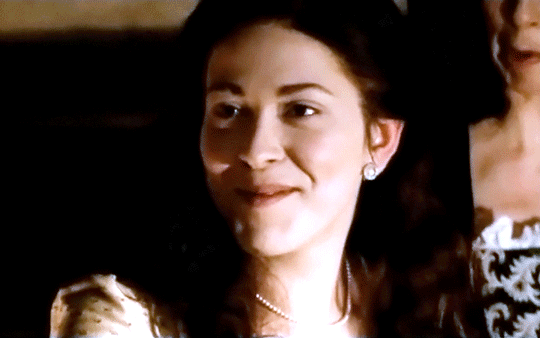

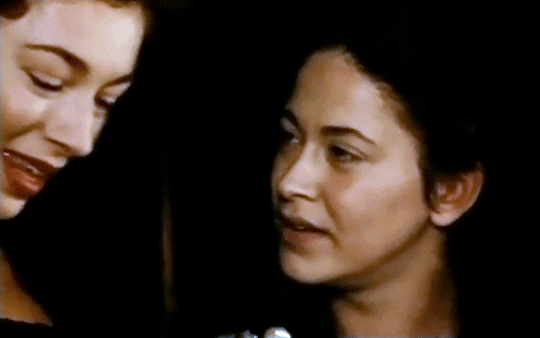
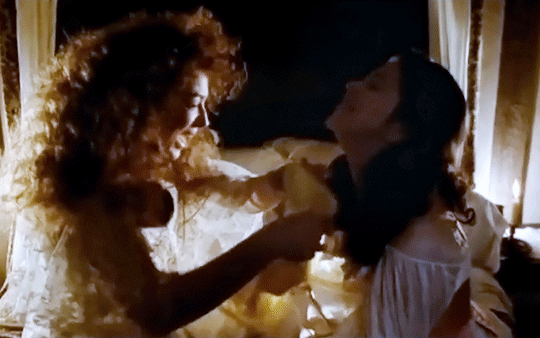
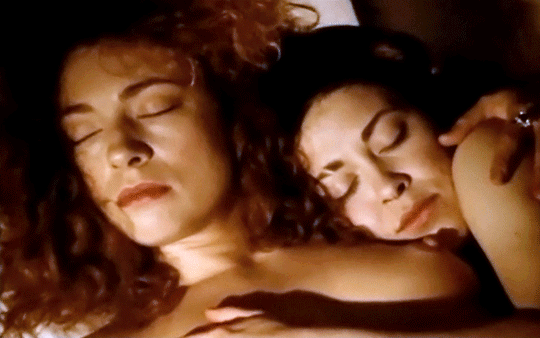
Moll & Lucy
The Fortunes and Misfortunes of Moll Flanders - 1996
#Alex Kingston#Nicola Walker#Moll Flanders#Lucy Diver#The Fortunes and Misfortunes of Moll Flanders#my gifs#tv edits#tv : Mini Series#tv : Period#tv : British#akedits#1996#harold they're lesbians
90 notes
·
View notes
Text
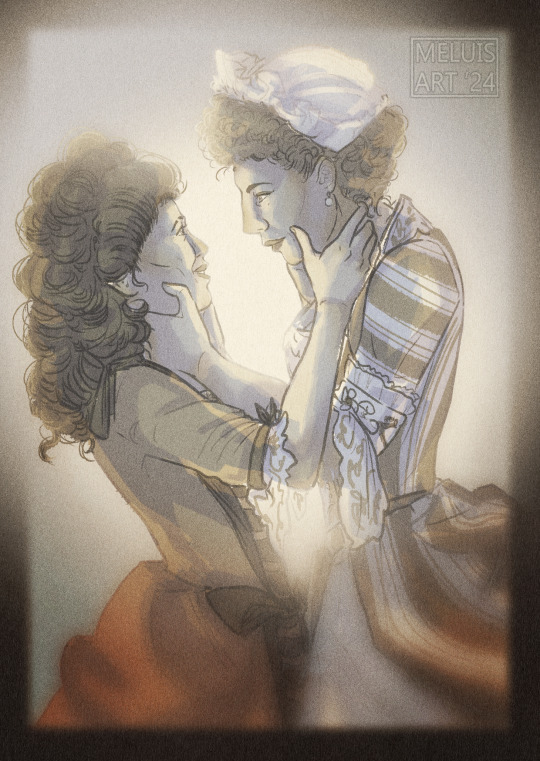
DIVER & FLANDERS
We don't need no permission for freedom
And we don't need no crown to be kings
This was only supposed to be a sketch but then the sketch got out of hand, and it's become a bit of a refined sketch. I couldn't just leave it at linework, even though that was the intention.
The intended interpretation here was the morning of the day of Lucy's arrest, before they went out with the intent to steal. A small stolen moment of serenity. But of course, you're welcome to interpret as you wish.
#lucy diver#moll flanders#nicola walker#alex kingston#the fortunes and misfortunes of moll flanders#meluisart
28 notes
·
View notes
Text
“In the sky, after drifting in power for a few seconds, Chuuya lost the black wings on his back and drifted down gently. Dazai caught his body.”
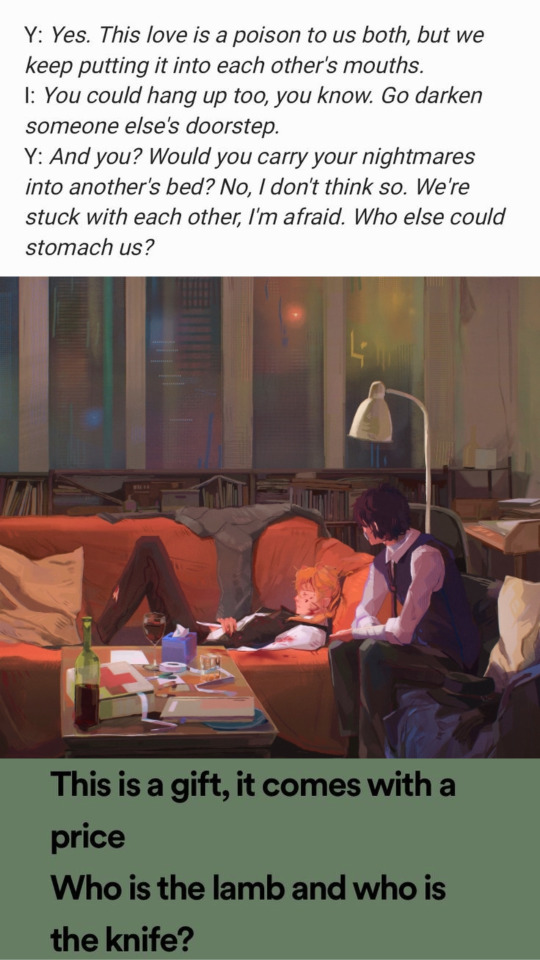
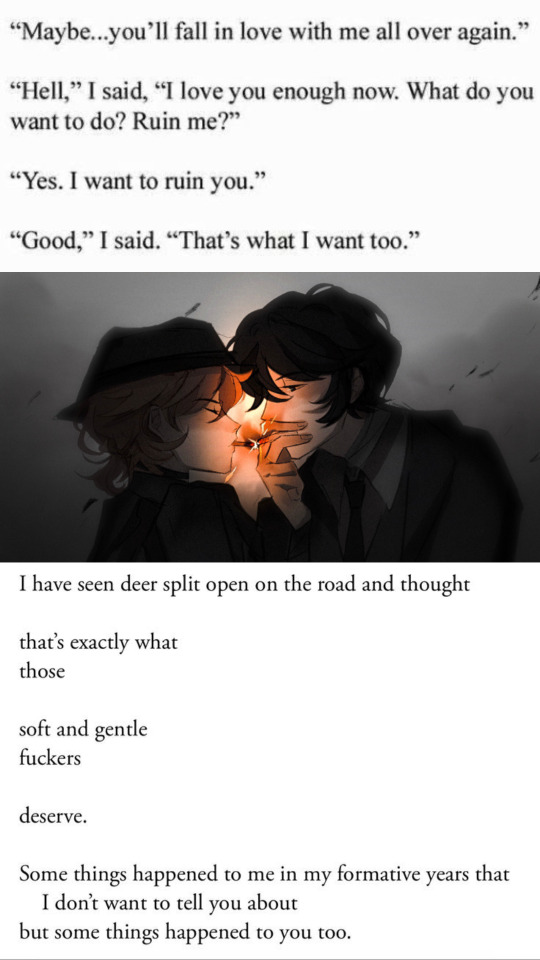
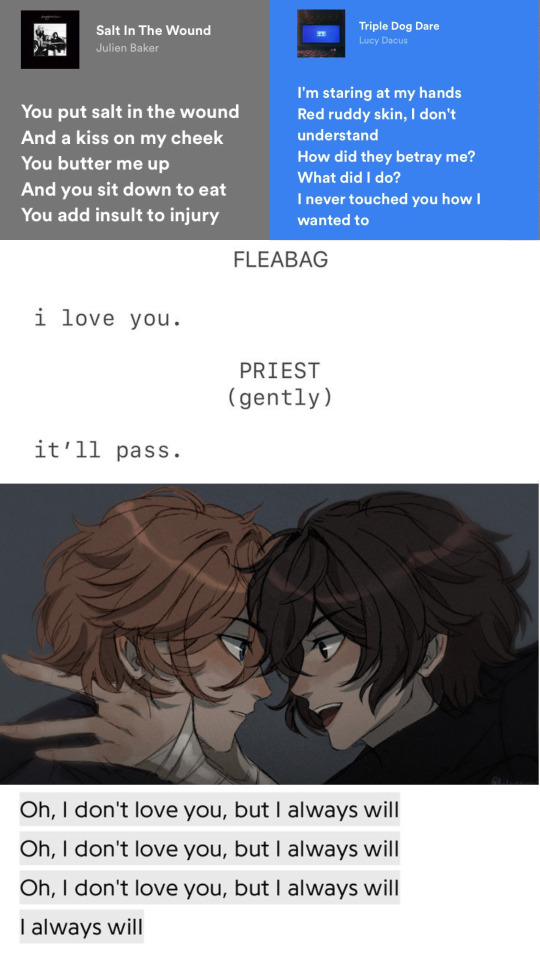


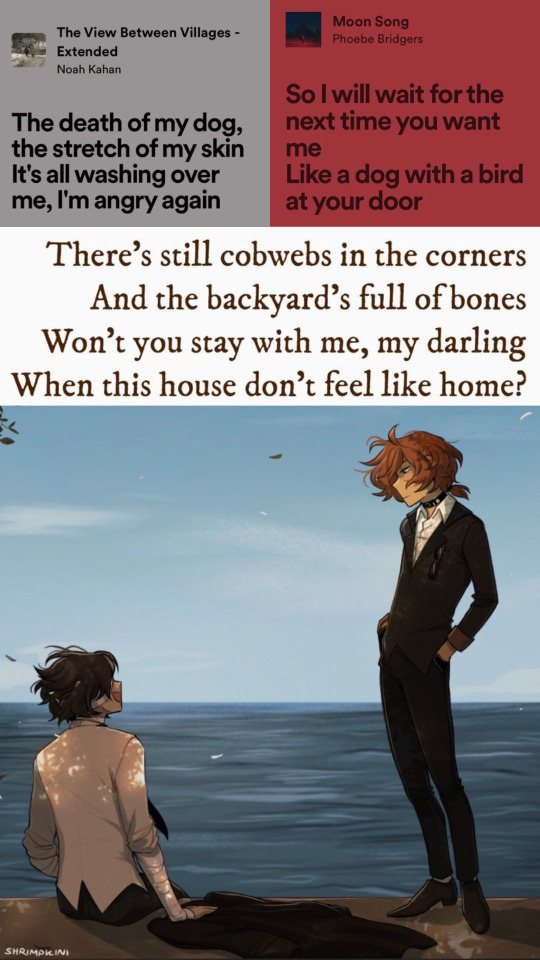
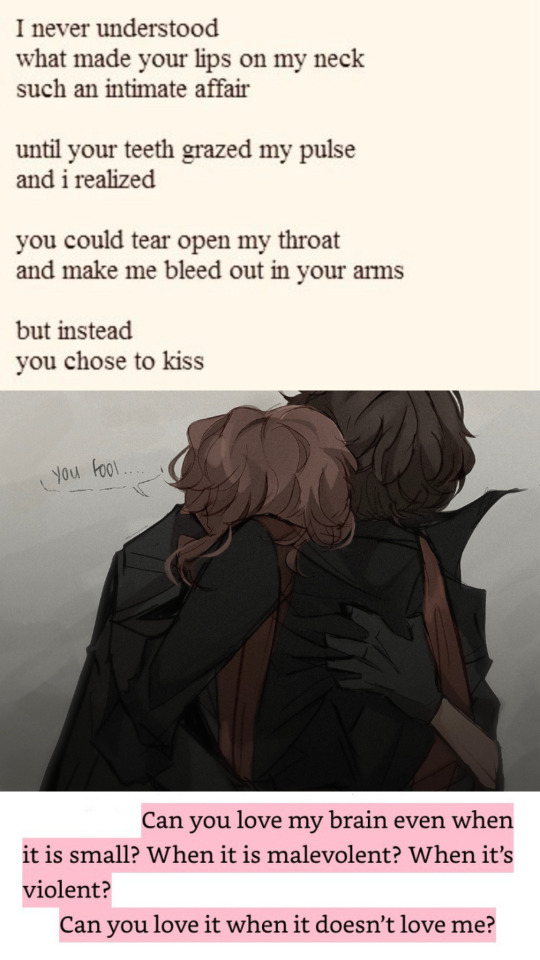
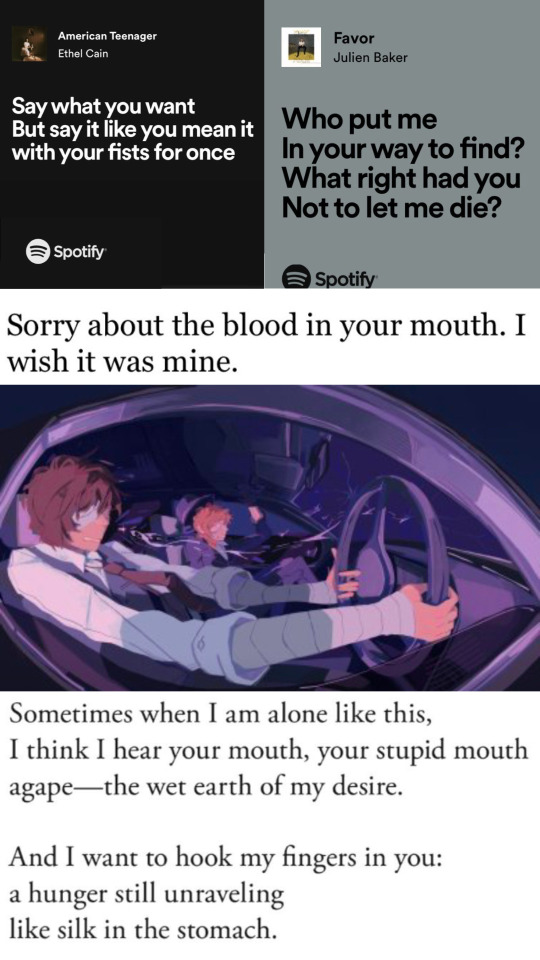

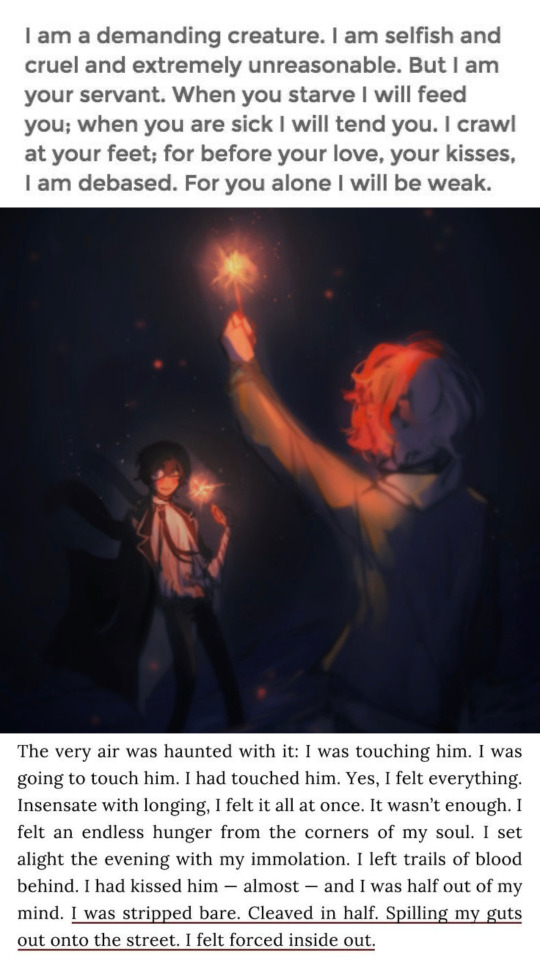
for more soukoku webweaves
creds:
joan tierney// art by @pleucas// rabbit heart - florence+the machine//a farewell to arms - ernest hemingway// art by @lotus-pear// salvage - hedgie choi// salt in the wound - boygenius// triple dog dare - lucy dacus// fleabag - phoebe waller-bridge// art by @lotus-pear// poison & wine - the civil wars// sue zhao// art by @pleucas// wishbone - richard siken// i am the antichrist to you - kishi bashi// we’re in love - boygenius// sue zhao// art by @kamapon// fleabag - phoebe waller-bridge// the view between villages - noah kahan// moon song - phoebe bridgers// curses - the crane wives// art by @shrimpkini// unknown// art by @lotus-pear// alone with you in the ether - olivie blake// american teenager - ethel cain// favor - julien baker// little beast - richard siken// art by @pleucas// lessons on expulsion - erika l. sànchez// true blue - boygenius// sedated - hozier// the trials of apollo: the hidden oracle - rick riordan// art by @lotus-pear// deathless - catherynne m. valente// art by @seukorei// the slaughterhouse - yves olade//
edit: I know one of the fanarts has do not repost on it, which is why I asked the artist beforehand if it would be okay for me to repost with credit. I’ve posted a picture of the messages just go under my #izzie rambles tag so do not worry it’s all good no need to send me hate on anon
tags (comment or send a message if you want to be added/removed):
@philzokman @dinosaur-mayonnaise @vivid-vices @pendragonstar @vinylbiohazard @fixation-central @sommmee @lotus-reblogs @galaxitic @gorotic @dazaisbbgrill @thesunshinebard @underthetree845 @whiteapplesandblackblood @pe4rl-diver @autistic-ranpo @the-gayest-sky-kid @ricelover888 @sskk-brainrot @liyv @hypotheticallyhaunted @sigskk @oatmilkbasic @sempieternall @pastel-paramour @thornedarrow @springkitten @sproutingstars @ghostsinacoat @shroombunnies @megaroniandcheez @http-bluewerry
also please tell me if me tagging you actually worked because I’ve been having some issues with tagging other users
#bsd#soukoku#skk#dazai osamu#nakahara chuuya#izzie posts#bungou stray dogs#dazai chuuya age fifteen#bsd stormbringer#bsd fifteen#bsd chapter 113#bsd chuuya#bsd skk#bungo stray dogs#bsd dazai#skk fluff#skk angst#soukoku fluff#soukoku angst#chuuya nakahara#bsd double black#bsd memes#web weaving#if this flops i will cry#this is a threat
288 notes
·
View notes
Text
For @alwayschasingrainbows. Another long-owed item! I think this is the short you were hunting up, a few months ago? I couldn’t find the original post because I’m lame, and never tag things right, so I guess I’m really just hoping this is it!
The Price, by Lucy Maud Montgomery, from After Many Days, Tales of Time Passed.
ON THE DAY when Dr. Lennox told Agatha North that she was out of danger and would soon be as well as ever, if she took proper care of herself, Agatha smiled her old, gallant smile up at him and Christine and Nurse Ransome.
"That's the most interesting thing you've said this long while," she told him. 'I was beginning to think you were stupid - your conversation has been so dull. I'm glad I'm going to get better. I want to live. There are so many things I want to do yet. And, oh, I'd hate to die and leave all my nice dishes and my open fire - and that row of tulips I planted out the day I took sick." Christine and Dr. Lennox laughed, the former with a note of heartfelt relief in her laughter. It was so nice to hear Agatha say a whimsical little thing like that again.
She had been so ill; the attack of bronchitis had been very severe, and there were complications. But all was well now; she would soon be her old self again - darling Agatha. Christine bent and kissed her impulsively.
Nurse Ransome had not smiled, did not intend to smile. Her small, pale, watery eyes expressed entire disapproval of such frivolity on her patient's part; her narrow white face seemed to Christine narrower and whiter than ever. Christine hated her; she had not wanted to have her on the case, but no other nurse could be had at the time, and Miss Ransome was certainly competent. Nurse Ransome could not hate - she had not enough intensity for that - but she disliked Christine and pretended to herself that she disdained her. She would have said that Christine was a vain, proud, selfish, thoughtless, idle chatterbox. All of this, and more, was true; but it was equally true, though Nurse Ransome would never have said it, that Christine was an exquisitely pretty, loving, winsome, sensitive creature.
Dr. Lennox was thinking this, as he looked at her across Agatha's bed. He was madly in love with Christine, as all Harrowsdene knew. They were not engaged yet, but everybody took it for granted they soon would be. A good many people thought Dr. Lennox was making a mistake. of course, Christine was a North and would eventually be the heiress of Agatha's not inconsiderable estate, including "Whiteflowers"; but then she was such a wild, laughing thing, "a pretty butterfly," Dr. Lennox's aunt called her contemptuously. She thought, they said, of nothing but dress, dances and beaus, and "spinning street yarn." She laughed and talked too much and too freely - "you always heard her before you saw her." "A doctor's wife above all things should know how to hold her tongue - she would ruin his practice." She was far too intimate with Jen Keefe and her set; she was delicate; she was extravagant; she was, in short, thoroughly spoiled.
Ward Lennox had been told all these things at sundry times and by divers people, and they had made no impression on him at all. He had loved Christine from the moment of their first meeting, and he meant to ask her to marry him as soon as he could muster up the courage to do it. In his eyes she was all but perfection; her few faults were but the faults of petted youth; the only thing he seriously disapproved of in her was her intimacy with Jen Keefe, that lady of the pale gold hair and over-large dark eyes and free-and-easy ways. But once Christine was his wife she would see no more of the Keefes. Ward Lennox fondly believed that he could mould Christine to his views in all things; he had no idea of the strength of will that lay hidden under the soft curves and behind the coquettish eyes of her youth.
Agatha smiled up adoringly into Christine's face. They were cousins, but Agatha was the senior by twenty years.
She had brought Christine up, when the latter was orphaned by the death of both father and mother in baby-hood: 'Whiteflowers was the only home Christine had ever known. She loved it and she loved Agatha passion-ately. But then everybody loved Agatha North, that busy, kindly, charitable, broad-minded, wonderful woman, who was always helping somebody or something, always planning and engineering and succeeding, always full of life and interest and zest and wholesome laughter. Why, Harrowsdene could not get along without Agatha North.
A sensation of relief and gladness went over the whole town like a wave when Dr. Lennox went away from "Whiteflowers" that day and spread the news that Agatha was going to get better and would be about in a few weeks. There had been anxiety; bronchitis so easily ran to pneumonia, and Agatha had the "North heart.”
Before he went away Dr. Lennox explained the change of medicines to Nurse Ransome and Christine.
"She is listening to him, not to what he says," thought Nurse Ransome, watching Christine covertly.
Christine was more aware of Ward Lennox than of what he was saying. She thrilled with a delicious sense of his nearness; she was acutely conscious of his tall straightness, his glossy black hair, his luminous dark blue eyes, and the passionate tenderness she sensed behind the aloofness of his professional manner. But she heard what he said distinctly and remembered it per fectly for all this. She never forgot anything Ward said to her. In all the world there was no music like his voice.
"This is her regular medicine," said the doctor. "Give her four of these tablets every three hours. This," he held out another smaller bottle, "is only to be used if she has one of those restless attacks at night and cannot sleep. Give her one of these tablets - on no account more than one - every four hours if necessary. Two would be dangerous - three fatal. I'll set the bottle up on this little shelf by itself."
It was Christine's turn to sit up that night. Nurse Ransome repeated the caution about the tablets before she went to her room. Christine listened with a slightly mutinous, insolent expression; there was no need of Nurse Ransome's reminders. She had not forgotten what Ward had said; she was not a child. She sent a glance of pettish dislike after the spare figure of the nurse. She felt that Nurse Ransome insinuated doubts to the doctor as to her fitness for waiting on Agatha; it was agony to think he might have or acquire a poor opinion of her in this respect. Christine was vain and abnormally proud; she could not bear to be looked down upon by anybody for any reason. She hated Nurse Ransome because she felt that Nurse Ransome looked down upon her. Christine would have gone to the stake in olden days, not for her religion, but for dread of the contempt she would incur from her co-religionists if she proved too weak for the test of martyrdom. The most acute suffering of her childhood had been endured when a schoolmate had publicly taunted her with a distant cousin of the Norths who had been sent to prison for forgery. She never forgot the shame and humiliation and torture of that day.
Agatha was very restless that night. At the best of times she was liable to sleeplessness - strangely so for her type. At ten o'clock Christine gave her one of the tablets and at two another. She was very careful to set the bottle back on the bookshelf. She was afraid of it. She hoped Agatha would not need it again.
When a week had passed Agatha was feeling so well that she wanted to be allowed to sit up. Dr. Lennox would not permit it. He told her her heart was not yet tit for any exertion. "You must lie here for another week yet. Then I may let you sit up for a few minutes every day."
"You tyrant!" she said, smiling up at him. 'He is a tyrant, isn't he, Christine? My heart isn't going to kill me. My grandmother had the same kind of a heart and she lived for ninety-five years. I'm going to live for ninety-five years - and enjoy every minute of them, and do a thou sand things I want to do.
She laughed up at him and Christine. Dr. Lennox laughed back - dimples came out in his cheeks when he laughed - said good-night, and went out of the room.
Christine put the green shade over the light, and sat down by the window. It was her night to watch again, but the night vigils by now were little more than matters of form. Agatha had never required the sleeping tablets since that first night. She slept soundly, seldom waking until dawn. The sinister little bottle had never been taken down from the bookshelf.
Christine at the window began to dream, looking out into the chilly moonlit night of October. She was beginning to wish acutely that Agatha were quite well. She was getting tired of the sick room, tired of the monotonous existence which Agatha's illness had necessitated. She wanted to get back to her gay round of social doings again, the dances, the teas, the dinners, all the diversions of the little town. She wanted to wear her pretty dresses and jewels again - Christine loved jewels. Agatha had given her a string of tiny real pearls and a glittering Spanish hair comb for her last birthday. She had never had a chance to wear them yet. She wanted to flood
"Whiteflowers" with music again. Next to her love for Ward, music was Christine's most intense passion, and she had not touched her piano since Agatha became ill.
She wanted to get off for a weekend at Jen Keefe's Mus-koka lodge for the deer-shooting. She knew Agatha wouldn't want her to go, but she meant to go for all that.
It was nothing but sheer envy that made people talk about Mrs. Keefe and her set. There was nothing wrong bound by silly old conventions with them; they were gay and up-to-date and not hide-
Then she let herself think of Ward Lennox - gave herself up to a vivid dream of their life together. She forgot her surroundings totally until she was recalled to them by a realization that Agatha was moving uneasily on her pillows.
Christine went to the bed. "Do you want anything?"
"I think I must have one of those tablets," said Agatha.
"My restlessness has just returned - I thought perhaps it wouldn't - I've been doing so well lately. But for half an hour now I've just wanted to toss and scream."
Christine went over to the table, took down the bottle and returned with a tablet. She moved a little absently, for she was still partially in her dream of Ward.
After Agatha had taken her tablet she soon fell asleep.
It was now eleven o'clock. Christine went back to the window and dreamed herself into a doze, leaning back in her big upholstered chair. She did not awaken until Agatha called her. It was the first time she had slept on guard.
"Would you like another tablet, dear?"
"No. The restlessness is gone. I think I'll sleep normally now - but since I'm awake, give me my regular dose. Ugh, when will I ever get square with Ward Lennox for all those hundreds of detestable little white tablets he's made me swallow? But after all they're preferable to the nauseous tablespoonfuls of liquid his father used to inflict on me."
Christine went over to the table rather stupidly. She yawned - she was not wholly awake yet. The clock in the parlour below was striking three. She counted the strokes absently as she took out the four tablets. Agatha sat up in bed to wash them down with a sip of water from the glass Christine held to her lips. She had been warned not to do this and now she slipped back with a sigh.
"I'm weaker than I thought I was."
"Is there anything else you'd like?" Christine asked, smothering another yawn.
"No, no, dear. I'm all right. It's only that I rather feel as if I were a dish of jelly and would all fall apart if violently jarred," said Agatha. "Go back to your chair and rest all you can. Sitting up like this is too hard on you - you're not strong. But you won't have to sit up many more nights. How glad I'll be when I'm well again. It will be so nice to keep my house again - and read my books - and eat just what I want - and be finally rid of that respectable female, Miss Ransome."
Christine went back, but she was thoroughly wakened up now and did not want to sleep. Agatha was soon asleep again. Moving softly, Christine turned on the light by the dressing table, screened it from the sick bed, and sat down before the mirror. Taking the pins out of the masses of her rich glossy black hair she began to experiment with various ways of hairdressing. Christine loved to do this. She was very proud and fond of her beautiful hair, and was in the habit of spending hours at her glass, sleeking and brushing it. After several experiments she got it up in a new way she liked exceedingly. She would wear it like that to Jen Keefe's next dance - with her Spanish comb in it. She slipped across the hall to her own room, and returned with the comb, and put it in her hair. How pretty she was! She leaned her elbows on the table, cupped her chin in her hands, and studied her reflected face earnestly. How very white her skin was!
What a delicate bloom was on her round modelled cheeks. How golden-brown her eyes were behind their long black lashes; her forehead was rather high, but this new way of doing her hair banished that defect. Her neck and arms were lovely. She was the prettiest girl in Har. rowsdene, there was no doubt of that. And the happiest.
And she would be happier yet - when she married Ward.
Oh, she was going to have a splendid, joyous life - ever so much gayer than life at "Whiteflowers" had been.
Though Agatha was a darling, she did not care much for social doings. But as young Mrs. Ward Lennox, she could do as she liked. Ward adored her - he would give her her own way in everything. No "settling down" for her into any poky routine of married life, looking after babies and pantry supplies. No, indeed - not for years to come. She hated children anyhow, children and housework. She was young and beautiful: she would grasp at all youth and beauty could give her. For years to come she would know the joy of pleasing the eyes of men.
She would entertain: Harrowsdene should have its eyes opened. And she would never give up Jennie. Ward didn't like her, she knew, but he would get over that. He would have to get over his strict old-fashioned notions about things. She loved Jennie; Jennie was a dear thing, so gay and good-hearted. Of course, she wasn't an old Calvinistic prude like most of the Harrowsdene women - like all of them, except Agatha. She believed in living and letting live. So did Christine.
"I'm - going - to - do - exactly - as - I - please," she nodded with every word at the radiant face in the glass.
"'I'm - going - to - have - a - splendid - time."
She touched her lovely shoulders admiringly.
"How sorry I am for ugly women," she said. "What can they have to live for? But, of course, there must be some to do the stupid drudgery of life. We who are beautiful should be exempt from all that. It is just enough that we are beautiful."
She laughed softly again, softly, triumphantly, inso-lenily, defiant of fate - the last laughter of her youth.
It was dawn now. Agatha still slept. Christine turned off the mirror light and went to the open window. The grounds of 'Whiteflowers" were very lovely in the faint, pearly lustre. The wind was whistling rather eerily in the dead reeds of the little swampy hollow behind "White-flowers," but the sky was exquisite, with white clouds floating across it.
It was going to be a fine day. Christine was glad. She hated dull stormy days. She would go to see Jen in the afternoon. She hadn't been anywhere since Agatha took ill. But there was no need to mew herself up any longer.
She turned and went over to the bed. Agatha was lying on the pillows, her face turned to the grey light. Something about it sent a strange, horrible dart of vague dismay to Christine's heart. She bent once and touched Agatha's cheek. Christine had never touched a dead person's cheek before - but she knew - she knew.
A shriek of terror broke from her lips. Nurse Ransome, who had just been coming across the hall, rushed through the doorway, followed by old Jean, the house-keeper, who had been on her way downstairs. Nurse Ransome saw at a glance what had happened, but she went promptly to work with all proper attempts at re-vival. Jean was dispatched downstairs to telephone for the doctor. White, shaking, useless, Christine was told to open the other window.
Christine went uncertainly toward the window. On her way she passed the table where the medicine bottle stood. Suddenly she stopped, looking at it. The bottle of sleeping tablets was on it. It had not been put up in its place at eleven o'clock. The bottle of regular tablets was back in the corner, half hidden by the window curtain, just as it had been at eleven o'clock.
What had she given to Agatha at three o'clock?
A hideous conviction suddenly took possession of her mind. She remembered - as if the whole incident rose out of subliminal depths into consciousness - she remembered feeling the raised letters of the poison bottle in her fingers as she counted out the four tablets. The regular medicine bottle was smooth. Her conscious mind, dulled by sleep, had not been aware of what she was doing - had retained no memory of it. But she knew what she had done. At eleven o'clock, her thoughts still tangled in the cobweb meshes of her voluptuous dream-ing, she had forgotten to put the sleeping tablets safely back on the shelf. At three o'clock she had picked up the bottle and given Agatha four tablets from it. Four - and three were fatal!
A sensation of deadly cold went over her from head to foot - then nausea, horrible, beyond expression. She fought it off, and, blindly obeying the dictates of an impulse that had no connection with reason but rushed furiously up from the deeps of being, she caught the poison bottle in her icy hand and set it on the shelf, with one wild, terrified look back at Nurse Ransome. Nurse Ransome had not seen; she was busy with what had been Agatha.
Christine felt herself falling - falling - falling - into unimagined, unimaginable depths of horror. She slid down to the floor by the table, unconscious.
AGATHA NORTH'S DEATH, coming when everyone had supposed she was beyond all danger, shocked Harrowsdene to its centre. She had died in her sleep from heart failure, Dr. Lennox said. He had known it was possible, but as she herself had said, her grandmother had lived to old age with just the same kind of a heart, so he had not been much afraid of it. There was no doubt - no suspi-cion. Everybody was very sorry for Christine who seemed, it was said - for but few people saw her - to be dazed by the blow.
When Christine had recovered consciousness in her own room, Dr. Lennox and Nurse Ransome had tried to keep her there, but she broke away from them with unnatural strength and ran wildly to Agatha's room.
Nurse Ransome was quite disgusted with her entire lack of self-control. She had screamed - laughed - implored Agatha to speak to her - look at her. Agatha had always answered her when she called before. Now she did not even open her eyes - her beautiful, large-lidded eyes.
Christine had wrung her hands and torn her hair. Mingled with all her horror and agony was incredulity.
This thing could not have happened. Agatha could not be dead - it was absurd - impossible. Why didn't they do something?
"Everything has been done - everything," said Ward
Lennox compassionately. Even he did not like this frenzy of Christine's. But she was very young and this was her first sorrow. Agatha had been everything to her, mother, sister, comrade.
Under all Christine's agony was a horror of the discovery of what she had done, and a mad, unreasoning determination that it must not be discovered. She fainted again when she was forced to accept the fact that Agatha was dead; when she recovered she was calm, spent, quiet. She learned that Ward thought Agatha had died of heart failure; no one seemed to have the slightest inkling of the truth. Nurse Ransome questioned her concerning the events of the night, sharply enough, with a shrewish glint in her eyes, as was her way, but evidently without suspicion. Christine told her tale unhesitatingly, looking straight into Nurse Ransome's eyes as she told it. She was glad it was Nurse Ransome and not Ward Lennox who asked her. She could not, she thought, have told that story unshrinkingly to him.
Agatha had been very restless at eleven - she had given her one sleeping tablet and she had slept until three. Then she had asked for her usual medicine.
"I gave it to her," said Christine unquailingly, "and then she went to sleep again."
"Was there anything unusual about her?" asked Nurse Ransome. "Did she complain of anything?"
"I noticed nothing unusual." Christine's voice was steady and even. "She spoke of feeling her weakness - and she raised herself up to take her tablets before I could prevent her.
Nurse Ransome nodded.
"The exertion may have affected her heart a little. She must have died soon after three o'clock, Dr. Lennox says. It is strange you never noticed anything before morning."
"I was sitting over by the window - I never heard the slightest sound from her. I thought she was asleep."
"Did you doze off?" Nurse Ransome was a little con-temptuous.
“No, I was wide awake all the time," said Christine deliberately.
She was tearless now, tearless, cunning, and terrified to the bottom of her soul. She shut herself up in her room when Nurse Ransome had gone and walked the floor.
No one must ever know. She would not confess. It could do Agatha no good now. And what harm might it not do to herself? She was wholly ignorant of what was or might be done in such cases and in her ignorance imagined the worst. They might not believe her - not now, at all events, after those instinctive lies of terror - they might think she had done it on purpose, that might the sooner fall heir to Agatha's money. Sent to prison - tried - she, Christine North, on whom the winds of heaven had not dared to blow too roughly. And even at the best - even if they believed her - even if nothing could or would be done to her - what shame, what humiliation, what outrage to her pride! To have it known that she had poisoned Agatha, her virtual mother, through sheer carelessness, to be always pointed out as one who had been capable of such a deed, no, no, she could never face such a thing - never. Anything, any fate, would be better than that. And she knew what her fate must be. She could never marry Ward Lennox now. Confessed or unconfessed, this thing must always stand between them. But just now in her guilt and dismay and dread, this seemed of little moment. The soul can entertain but one overmastering passion at a time.
She stood before her mirror and looked at her changed face, her white, haggard face with its horror-filled eyes.
It was as if in one hour she had passed from youth to middle age.
"I will not tell - it must never be known," she whis-pered, clenching her hands.
Her dread, and the unscrupulous determination caused by it, carried her through the funeral. People talked of her unnatural composure and her marble-white face. They pitied her, knowing what she had lost in Agatha. But in the back of their minds was the thought that she was a rich woman now, the mistress and owner of "Whiteflowers," and in due time would be wife of Ward Lennox. Back of this again was a thought, or rather a feeling, that giddy, shallow Christine was not worthy of such good fortune.
"She didn't shed a tear - too proud to cry before folks, North-like," said old Aunt Hetty Lawson. "She doesn't become her black. You'll see, she won't wear it longer than she has to. She'll make Agatha's money fly. Well, well, Harrowsdene will miss Agatha North. There aren't many women in the world like her."
Christine never forgot the agony of that hour. She had to sit still among the mourners. She had to look once more on Agatha's dead face - Agatha's lovely, placid face and know that she had killed her, had cut her off in her gracious, beloved, useful prime. Agatha, who had loved her so entirely and whom she had loved so deeply in return. She had to endure the consolations of people who would despise and condemn her ruthlessly if they knew the truth. At moments it seemed to Christine that they must know it - that her horrible inward sense of guilt and remorse must be branded on her face for all to see. Her own realization of what she had done was so intense and vivid that it seemed as if it must radiate from her to the minds of all around her. Yet she sat on like a white statue, as motionless, as seemingly calm as the dead woman herself.
It was over; Agatha's beautiful soul, full of fancy and charm and love, had gone to its own place; her ripe, beautiful body was buried in Harrowsdene cemetery and covered speedily with a loose drift of autumn leaves.
And Christine shut herself up at 'Whiteflowers" alone, refusing to see anyone, even Ward Lennox.
Her dread of being found out was almost gone. Agatha was buried. Since there had been no suspicion before, there would be none now. She was safe. But now that terror was over, another emotion rose up and possessed her soul, horror of herself, passionate, unappeasable remorse. By sheer carelessness she had killed Agatha; she had preened and exulted before her mirror while Agatha was lying dead behind her - Agatha who wanted so much to live. she must atone for it, she must atone for it by lifelong penance. Sitting alone in her room, listening to the heavy rain that she knew was streaming down on Agatha's unprotected grave, she made her enduring vow.
"I have robbed her of life. I will not have life myself," said Christine.
AT FIRST people thought the change in Christine was merely the result of grief and trouble. It would soon wear off, they said. But it did not; then they began to talk and wonder and whisper again. They talked and wondered and whispered until they were tired of talking and wondering and whispering and lapsed into acceptance of a threadbare fact.
Christine cared nothing for their talking and wondering and whispering. She was bent only on atonement - bent on dulling the sting of remorse to a bearable degree by increasing penance. Within a month of Agatha's death she had organized her existence on the lines it was henceforth to follow, and nothing - entreaty, advice, blame - ever availed to move her one jot from her elected path, until people gave up blaming, entreating, advising; left her alone, and practically forgot her. Nobody could ever have believed that, much as Christine was known to have loved Agatha, her sorrow could have had such a lasting and revolutionary effect on her. But since it was undeniably so, they accepted it, concluding that Christine's mind had been affected by the shock of Agatha's death. After all, there had always been a strain of eccentricity in the Norths. Agatha herself had been eccentric in her very philosophy of living - so gay and tolerant and vivid at the years when other women had grown sober and hidebound and drab with the stress of existence.
Christine, with her own hands, put away all the things Agatha would never wear or use more, pretty things all of them, for Agatha had loved pretty things. She hung Agatha's picture in the room where Agatha had died, that she might not see it, and locked the door. But she took the brown bottle of sleeping tablets and set it on her own dressing table before her mirror, on the dressing table from which had been banished all the little implements of beauty she had been wont to use assiduously. She had no longer any use for them, but every night and every morning as she brushed her thick black hair straightly and unbecomingly off her face to its prim coil behind, she looked at the deadly reminder of her deed.
Ward Lennox respected her grief and desire for solitude as long as he could bear it. Then he went to her, told her his love, and asked her to marry him. Christine coldly refused. He was thunderstruck; he had been sure Christine loved him. Had he not seen her eyes change at sight of him, the revealing colour rise in her lovely face?
Yet now she looked unblushingly at him and told him she could never marry him. He did not give up easily; he urged, entreated, reproached. Christine listened and said nothing.
"Don't you love me?" he asked.
"No," she said, with her eyes cast down.
Ward did not believe her. He went away at last, intending to return soon. But when he went back he rang the bell at 'White flowers" unavailingly; and no answer came to his letters. He tried at intervals for a year to see Christine; then he gave up, convinced that she did not care for him, never had cared. What he had mistaken for love had only been the coquettish allurement of a wild girl, who had been sobered by trouble into a realization that she should not so play with the great passion of lie.
Christine loved him as she had always done. For one mad moment she was tempted to confess all and throw herself on his mercy. Surely if he loved her as he said he did he would overlook and forgive. But then, to fee always humiliated before him in his knowledge of her indefensible carelessness; she could not bear the thought.
This one master dread held back the words. Without it she would not have been strong enough to put away love from her, even for atonement. All other joys she could sacrifice to her craving for remorse. But not this. If it had not been for the pride that could not brook the thought of shame she would have fallen at his feet and gasped out the truth. But that pride sealed her lips forever.
She put all her old friends out of her life. Most of them had been of the Keefe set. When Mrs. Keefe came to
"Whiteflowers" old Jean Stewart told her ungraciously that Christine would not see her. Mrs. Keefe went away insulted and never made any further attempt to renew her intimacy with Christine. When, two years later, the scandal of the Keefe divorce case, with all its unsavoury details in the matter of a certain Muskoka house party, burst upon Harrowsdene, people said significantly that it was well Christine North was not mixed up in that. But by this time Harrowsdene had accepted and almost forgotten the new Christine.
Old Jean Stewart died three years after Agatha's death, and thenceforth Christine lived alone, keeping the big house herself in the immaculate fashion that Agatha had loved. She had always hated housework. She did it all now, down to the very scrubbing and stove-blacking, taking a fierce satisfaction in these hated tasks, glad when her beautiful white hands, on which never a jewel shone, grew rough and hardened. She had to have help outside, to keep the grounds as Agatha had liked them. For this purpose she employed half-witted old Dormy Woods who pottered about all the lawns of Harrowsdene and liked to insinuate that he knew dark secrets about everybody. Sometimes the queer remarks he occasionally let fall gave Christine a start of dread; when he looked at her with his horrible filmy eyes and said leeringly, "I could tell strange tales o' some folks. she grew cold to her very heart. Was it possible he knaw and guessed her secret? No, it was not possible. But she was always uneasy in his presence, and it was for thar very reason she employed him. It was part of her pen. ance. Perhaps, too, old Dormy told her bits of unsolicited news now and then.
She gave largely and secretly to the charities that Agatha had always supported, but she never spent an unnecessary cent. When people called her miserly she said bitterly to herself, "That is better than being called a murderess." She never wore anything but severe black.
She never went anywhere save to the stores, where she did her economical buying, and to church. Every Sunday she sat alone in the old North pew, reading her Bible until the service began, never lifting her eyes. She did this because she detested reading the Bible. For the same reason she read a chapter in it every night and every morning. One month, eight years after Agatha's death, she suffered from a slight but uncomfortable affection of the eyes that was epidemic in Harrowsdene, and could not read at all. Then she discovered that she missed her Bible, that she had come to enjoy it. From that time she never opened her Bible again. Yet she had read through it so often that it had become part of her, its philosophy. its poetry, its drama, its ageless, incredible wisdom, of earth and of spirit, its unexampled range of colourful human nature were hers inalienably, permeating her soul and intellect.
Her reading was all heavy and serious now. She never looked at one of the sentimental romances she had once bivelled in. Now she read only the old histories and biographies and poems in the old North bookcases. This hoed part of the time left over from her meticulous housekeping; the rest she passed in knitting and sewing, making garments which she secretly sent to the poor of the nearest city.
She never touched her piano after Agatha's death; no one ever heard her sing again. She never spoke to anyone beyond a grave Good Day, and when people talked to her or strove to hold her in conversation she answered with brief gravity and went her way - she who had once been such a chatterbox. She had put all companionship out of her life. She would not even have a cat or dog at "White-flowers." She kept the flowers that Agatha had loved in her garden, but she never touched one. Moonlight was still a fair thing, but she would not look at it. She would not accept any enjoyment, and she never for one waking moment forgot that she had killed Agatha. The passing of years never dulled or dimmed the realization. Sometimes she dreamed that people knew of it and looked on her with horror and contempt. She would wake up with perspiration on her forehead and breathe a word of passionate relief that it was only a dream.
She did not wholly succeed in banishing all passion from her life. When old Dormy told her that he'd heard Dr. Lennox was going to marry Florence King, the high school teacher, she felt a sudden savage thrill of jealousy.
"Surely he will never marry that stiff, pedantic crea- . ture," she thought. Yet she knew Miss King was handsome and clever, and Dormy reported Harrowsdene as approving the match. That night Christine looked from her window through the gap in the pines to the light that burned in a house across the river. She knew the light was in Ward Lennox's office, and she kept an ugly vigil with pain and longing. But by dawn she had conquered it. Ward Lennox might marry Florence King. It was naught to her. She had put all that behind her.
But Dr. Lennox did not marry Florence King; he did not marry anyone, though gossip linked his name with this or that for many years before it accepted the fact that Dr. Lennox meant to remain a bachelor. He was a busy, friendly man, with a large practice; everybody liked him and trusted him. People got well of serious illnesses iust because they believed in him. His personality cured more patients than his medicine. He was no hermit. He went freely into society and enjoyed life. He and Chris. tine never met. At long intervals they passed each other on the street. He would bow courteously and Christine coldly; that was all. People had forgotten that it had ever been supposed they would marry.
AFTER THIS FASHION fourteen years passed. Christine was thirty-four years old - if anybody had thought about her age. Nobody did. Her own generation were all married and gone. To the younger she was what she had always seemed - a grave, stately, middle-aged eccentric woman, considered miserly, living her strange secluded life at old-fashioned "Whiteflowers." She was always pale, darkly and plainly dressed; yet there was a haunting, tragic charm about her that made the younger beauties seem cheap and common beside her. Christine never thought about her appearance save when, looking into her unshaded mirror over the brown bottle on the table, she saw the lines on her face and the slight hollows in the cheeks that had once been so round and delicately hued, and had a momentary impression that she was old and faded - much more so than her contemporaries. But that was part of her atonement. She had given up her beauly when she gave up love and life's fulfillment.
Her atonement was becoming easier - too easy, she thought. She had ceased to have wild longings of the things she had put away from her. She had ceased to dream of Ward - ceased to desire feverishly to find open her silent piano and plunge her fingers into music. She was beginning to like her housework, her reading, even her sewing and knitting. When she realized this, she felt all the old sting of her guilt and remorse. She must not be happy. What could she do to make herself miserable?
The thought came to her that she would adopt a child.
Nothing could be more distasteful to her. She had always disliked children. Most of all she disliked ugly children.
She went to the orphan asylum in the city and brought home its ugliest inmate - a boy of eight, with a pitiful little face scarred by some inhuman attack of a drunken father. His name was Jacky Brent and he was a timid, silent little fellow - the very type which made Christine feel most uncomfortable. But she revelled in her discomfort and in all the annoyances which the care and upbringing of this child brought into her methodical existence. She left nothing undone that could contribute to his comfort and welfare. She studied dietetic tables and child welfare magazines, and vexed her soul with balanced meals and tables of weights. She helped him with his lessons; she invited his schoolmates to "White-flowers" to make it lively for him and watched over their games and their manners, and got up appropriate lunches for them. She got a dog for him and forced herself to tolerate muddy paw tracks; she played halma and dominoes with him - even ball in the backyard because she abhorred it. She helped him with his les-sons, even, she remembered, as Agatha had once helped her. She helped him build a playhouse and picnicked with him in it. She forced herself to talk to him. She had lived so long with silence that she found it difficult to talk, and more difficult still to talk to a child. But she persevered, and eventually, as they gradually built up a little store of common interests, she found it easier and easier. Jacky learned to talk too, as his timidity wore off somewhat, and sometimes his quaint, unexpected remarks prompted in Christine a desire for laughter which she had long been a stranger. She never let herse laugh. She did not even smile, but momentarily the eyes of her girlhood returned to her.
In spite of his delicacy of appearance Jacky was a healthy child, but one night, when he had been ar (White flowers" nearly a year, he was suddenly taken violently ill. Christine telephoned wildly for old De.
Abbott. Dr. Abbott was away; there was nothing to do but send for Ward Lennox. Ward Lennox crossed the threshold of "Whiteflowers" for the first time in fifteen years.
He was cool, impersonal, professional; Christine was so upset about Jacky that she could think of nothing else.
They met and talked like casual acquaintances.
Ward Lennox told her that Jacky had appendicitis and that an operation was imperative. No time must be lost.
At dawn a trained nurse was in charge of the case, and the specialist from the city had come. Christine locked herself in her room and paced the floor until the operation was over. Then they told her that the abscess had broken before the operation and that Jacky's condition was very critical. Christine went back to her room.
She did not pray. She had never prayed since Agatha's death - she had never dared to. Always in the back of her mind was the feeling that she must not pray without confession - and she could not confess. She did not pray now; she looked at her drawn, anguished face in her Blass and for the first time she was unconscious of the little brown bottle under it.
Jacky might die, and she loved Jacky!
"I cannot live without him," she said, wringing her hands. "I cannot."
She remembered with a stab of horrible compunction that she had rebuked him sharply the day before for something he had said. She recalled his grieved look, the look that always came into his poor little face when he displeased her. He had always tried so hard to please her. That very night before he went to bed, when he had seemed so tired and dull, he had faithfully hung his clothes up and set his shoes straight, and put all his little treasures tidily away in his box, as her rigid rules re-quired. Christine went and looked at them, his little tops and nails and balls and engines, his new jack-knife and the old broken one he still loved because it had been his only prized possession in the asylum, his tin pail and spade, and the dancing monkey which had delighted him so. If Jacky died . ..
Jacky did not die. He recovered. And when he was well again Christine sat down in her room on the first day he went back to school and took stock of her emotions.
She had taken Jacky for a penance. He had ceased to be a penance; he had become her delight. She loved him with all the intensity of her passionate nature. She could not give him up - she could not. Such a sacrifice she could not make. She had once given her lover up in the surge of a new horror and remorse. But that surge had spent itself. She could not give Jacky up now; neither could she keep him with her guilty secret. One must be surrendered. She must make her choice.
When Jacky came from school, running through the hall calling gaily for "Aunty," who had petted and spoiled him all through his convalescence, her choice was made. She got Jacky his supper, helped him with his lessons and put him to bed, reconciling him to its unusual earliness by the promise of a treat on the morrow. Then she went out, bareheaded, into the autumn dusk - not realizing that she was bareheaded.
She had thought it all over. The tale must be told. She did not know what the result might be. Probably at this lapse of time nothing would be done to her. People would believe that it was merely carelessness and content themselves with gossip and wonder and condemnation. Christine's pride still cringed at thought of it, it would be horrible, horrible to open up the old wound, horrible to have her long-hidden secret proclaimed to her world. But it must be.
To whom could she tell it? Nurse Ransome had died five years ago. Ward Lennox? Yes, it should be to him. Her punishment must be as severe as it could possibly be.
She would go and confess to him.
She walked steadily along the street. The world about her seemed weird and purple and shadowy, with great cold clouds piling up above a sharp yellow eastern sky.
Christine felt that it was in keeping with her terrible errand; when she passed a house through whose open windows came the sound of music and laughter and dancing, she shuddered. Tomorrow these people would be talking of her - of her, Christine North, who had poisoned Agatha. And yet they were dancing tonight as if there were no such things in the world as horrible carelessness and never-dying remorse and public shame.
She struck her hands together in her misery but she went on.
Ward Lennox was sitting on his verandah when Christine came up the walk in the pale moonshine that was beginning to silver the October dusk. His amazement could not have been much greater if Agatha North herself had come up the walk - it almost made him speechless But he contrived to murmur a few conventional words and asked Christine to come in.
"I would rather stay out here," said Christine, who fell that what she had come to say could not be said in a lighted room.
She sat down in the chair he drew forward for her. The light streaming out through the window of the room behind her made a primrose nimbus around her shapely head. In the dim light she looked very beautiful, a majestic creature with that subtly knowing, deep-eyed white face of hers in its frame of flat dark hair. The lovely line of cheek and throat rose above her black collar. Ward Lennox suddenly remembered the time he had dared to kiss that white throat - the only time he had ever kissed her. It seemed to him that he could almost hear her little, deprecating laugh as she escaped him. Surely it had been the laugh of a woman who loved the man who kissed her. No coquette could have laughed just like that.
Christine looked straight at him, sensing the vast reserve of strength that underlay his external courtesy and gaiety and charm. How strong he was! And she - she had been so weak and cowardly!
"I have come to tell you something," she said.
"Yes," he said gently.
Christine waited a moment. She must find very plain, direct words. Her hands, she found, were clammy and her mouth was dry.
"I killed Agatha fifteen years ago. I didn't mean to - but I killed her."
"Christine!'
It gave her a strange shock to hear her name again. It was so long since she had heard it. For years she had been Miss North to everyone. Even to Jacky she was only "Aunty." Under the shock she was also conscious of an enormous relief, as if some horrible darkness or weight had been suddenly lifted from her soul.
She hurried on, rather incoherently now.
"I gave her four of the sleeping tablets by mistake, through carelessness. My thoughts were wool-gathering. I hadn't put the tablets back in the right place when I gave her one at eleven - and I fell asleep - and was stupid when I went to give her the regular medicine - and then I-I- played with my hair at the glass for hours, and she was dead - I never knew it. And I could not confess, I knew I ought to - but I was afraid to. I thought they might put me in prison, or always point the finger of scorn at me. I couldn't face it, so I lied. But I am telling the truth now, and I've done penance - oh, I've done penance. But I can't give Jacky up - so I'm telling it all now. Oh, whatever they do to me, don't let them take Jacky from me."
Ward Lennox was moved profoundly. Everything was clear to him now and, oh, the pity of it! For it had all been so unnecessary.
"Christine," he said slowly. "You did not kill Agatha. The tablets you gave her were quite harmless."
Christine looked up, dazed, incredulous.
"The day before Agatha died Nurse Ransome told me that she did not think the sleeping tablets would be needed again and I took them away, wanting them for another patient, as my supply had run low. I left in their place a bottle of tablets to be used if Agatha had any return of certain annoying digestive symptoms. They were harmless - the whole bottleful wouldn't have hurt her. I remember it all distinctly. Nurse Ransome should have told you. I suppose she forgot. Agatha died of heart failure - there is absolutely no doubt of that. Oh, Christine, my poor darling, and this was why - if you had trusted me…”
"If" indeed! Christine was struggling with a whirlpool of emotion in which a still half-incredulous joy was uppermost. She had not killed Agatha - there was no blood on her hands - that was the only fact she could grasp clearly now. Later on would come bitter regret, for her folly and cowardice, for the lost, wasted years, for everything she had thrown away in insensate sacrifice to her pride and her vain hunger for atonement. Later yet again would come a wistful realization that, after all, the years had not been wasted. Vanity, selfishness, frivolity had been stripped from her soul as a garment. Strength, fineness, reserve, dignity, all she had lacked had been given unto her in those years of penance; even physically they had not been barren. In her regular, simple life the delicacy of her girlhood had vanished. She had become a perfectly healthy woman. All this had been bought with a great price, but she could never have purchased it in a cheaper market.
She stood up ... and swayed unsteadily.
"I must go home - think this out. I can't - no, no, you must not come with me - I must be alone."
"Christine!" His voice was a sharp protest. "You are not going to shut me out of your life again - I love you. I've always loved you - we must…”
"Not yet - not yet," she besought him feverishly, pushing him away from her.
He stepped back and let her pass. He had waited long- he could wait a little longer.
Christine went blindly home to "Whiteflowers." She went to Agatha's room and knelt by Agatha's bed. For the first time in fifteen years she prayed - a prayer of thankfulness and humility. For the rest of the night she sat at Agatha's window looking out into the moonlit beauty of "Whiteflowers," or walked about the dim haunted room in a mingled intoxication of joy and regret. Under all the turmoil of her mind she felt curiously young again - as if life had suddenly folded back many of its pages.
Through the gap in the pines she saw Ward's light in the house across the river. For the first time since Agatha's death she let herself think about him. A door of life she had thought shut forever seemed slowly opening before her.
20 notes
·
View notes
Text
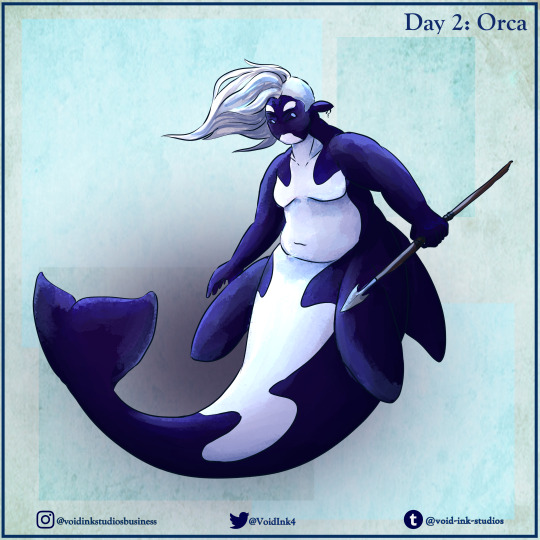
Day 2: Orca
Merms are not known for their use of tools. Some do, but many don't. Some will use rocks to break open shells or pry open caves, but most will opt for teeth and claws. However, even amongst the Merms who use tools, it's extraordinary to see one use our own in the way the White Bellied Diver. Lucy was known to the researches I was assisting, the matriarch of her pod. She carried an old harpoon with her, one she allegedly torn off a ship herself. There's always something a bit haunting when something that intelligent looks you in the eyes the way she does.
[Prompt List]
[Previous] - Day 1: Man O' War
[Next] - Day 3: Mola Mola
————————————–
Like the art? Please Reblog!
Interested in a Commission? Check out my post HERE!
Did you know I have a Ko-Fi? Check it out HERE!
#my art#digital art#mermay#mermay 2024#mermay day 2#fantasy#fantasy worldbuilding#worldbuilding art#mermaid#mermaid art#orca
18 notes
·
View notes
Text
I have a dim half-remembrance of long, anxious times of waiting and fearing; darkness in which there was not even the pain of hope to make present distress more poignant: and then long spells of oblivion, and the rising back to life as a diver coming up through a great press of water.
Lucy again describes her experiences of surviving after being fed on with ocean and drowning imagery.
"The pain of hope", like "Despair has its own calms".
All her anxiety, memory gaps, and dreaded anticipation of something lurking are reminiscent of Jonathan's imprisonment months. But he was at a stranger's house, at his host's mercy, Lucy is in her home, where she was supposed to be safest.
38 notes
·
View notes
Photo
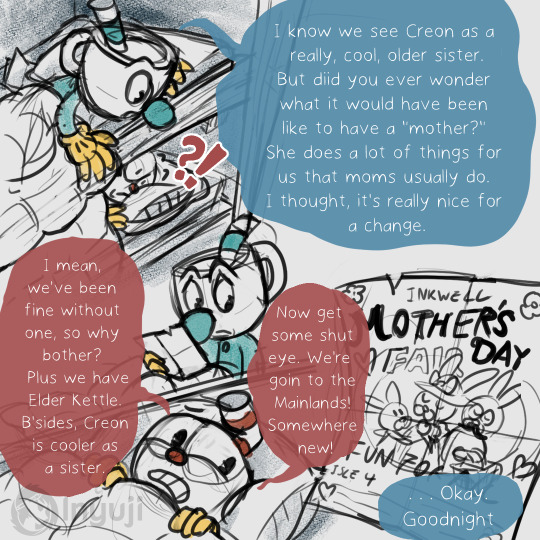

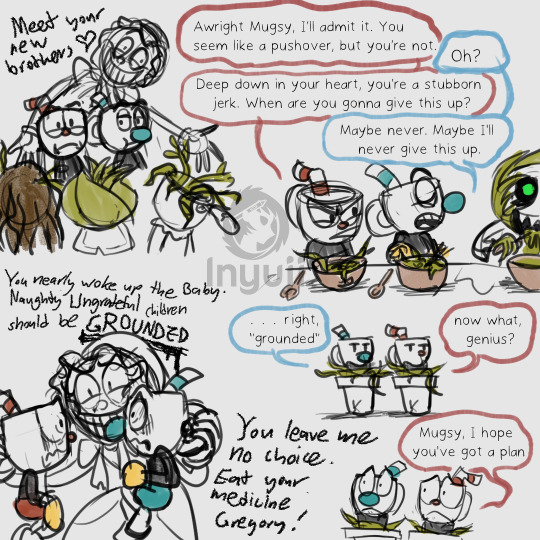
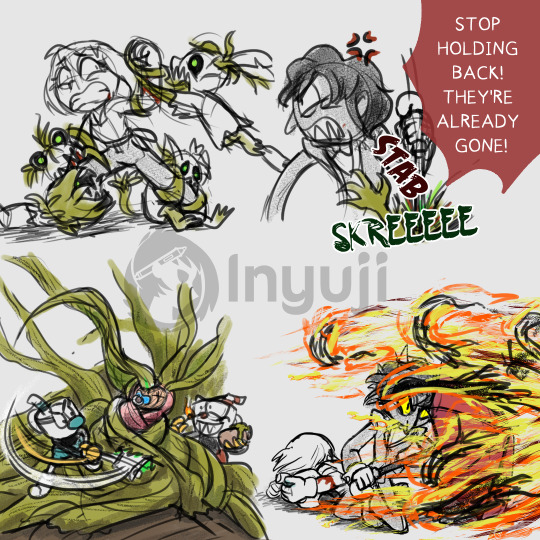
semi-adopted older sisters should be celebrated on Mother's Day also. Also beware of creepy ladies who try to adopt you and turn you into a plant zombie. Pending Title: Children of the Weed
Inkwell Isles always host a Mother’s Day festival each year, but switch which isle is hosting. Elder Kettle usually does a good job keeping the boys occupied. Plus they’re old enough to not be too broken over their non-existent parents. Can’t miss what you’ve never had before.
Ever since Creon came into the picture (for however long she’ll be stranded), Mugman has been chewing on the thought about mothers. Especially with Mother’s Day looming around the corner. When Mugman tried to ask Cuphead for his thoughts, Cuphead naturally brushes it off. He doesn’t want to think about it since the idea kind of bothers him too. Especially since Creon isn’t going to stay permanently forever.
Creon was hoping to distract the boys from the “Mother’s Day” fair by taking everyone to one of the Mainland states where she visits during expeditions. Unfortunately, she didn’t take into account that Mother’s Day is celebrated there too.
Oops.
The entire day, Creon is internally freaking out while trying to diver the boys’ attentions away from the constant reminder of the holiday. She fails miserably.
Mugman runs off to avoid the fair while Cuphead is forced to follow. The boys argue and Cuphead says some hurtful things about how Mugman is a spineless pushover who needs an adult to make decisions for him. So when a creepy lady offers to take in two lost children to join her family for tea, Mugman accepts out of spite; since he’s a “spineless pushover who needs an adult to make decisions for him.” Mugman can be a spiteful little $h!t. And Cuphead is forced to tag along.
The boys are introduced to an errant Mayweather member who has turned an abandoned schoolhouse into her “home” and luring/ kidnapping children to play “Mother.” Mugman continues to listen to his “temporary” mother, to spite Cuphead. Cuphead is creeped out by the entire situation.
Also points to people who get the reference in the 3rd batch.
Meanwhile, Elder Kettle threw his back amidst the chaos of losing the boys for just a few minutes. Creon was really hesitant to let Lucy/Devil tag along, but she was out of options. Especially with recent news about missing children cases in recent months. Creon and Lucy/Devil track down a possible trail the boys left.
Creon is horrified and petrified at having to hurt a bunch of kids, even though most are brainwashed. Nearly half were turned into plant zombies, while others obey out of fear, or in process of being turned. Lucy/Devil refrains from torching their assailants at Creon’s request. He resorted to mercilessly stabbing the feral plant kids. Lucy/Devil is perturbed at how much the situation has shook Creon, and a teensy bit concerned at her grief. Creon has had too many murders during her time of service, which includes children.
Eventually the feral Mayweather lady was put down via fire. Lucy/Devil was able to shield Creon and the boys who were directly in the blast range of Cuphead’s improvised bomb. Lucy/Devil has unintentionally developed a habit of watching Creon’s back. Sadly about half of the children were rescued. For the ones that were zombified and then put down, the other families were at least given closure.
The boys are able to enjoy the rest of the day and their trip with Elder Kettle and Creon.
#creon in inkwell#cuphead show#creon gilead#lucius mayweather#cuphead devil#cuphead and mugman#mayweather#mother's day#over the garden wall
62 notes
·
View notes
Note
Lucy wrote her memorandum so no one else will get in trouble through her, and if I remember correctly Jonathan too at one point said that he's writing about what is happening as facts for someone else to benefit from if he perishes...
You have excellent timing, I was actually planning to talk about yesterday's Lucy/Jonathan parallels when I came back to see this. Yes! In fact, there are several lines which call back to Jonathan quotes:
"If this book should ever reach Mina before I do, let it bring my good-bye."
Jonathan, 4 May
"I write this and leave it to be seen, so that no one may by any chance get into trouble through me. This is an exact record of what took place to-night."
Lucy, 17 September
I'm pretty sure Jonathan has a few other similar lines but this is the first one. And it becomes apparent that his journal is written for multiple purposes, including keeping his own sanity intact, serving as a record he can consult, a place he can be honest about his emotions... but from very early on it is also intended as a resource that can be seen by others. Jonathan's intention is for them to know the truth of what happened to him. But in a way at the end, the diary is also intended to serve the purpose of countermanding his own assistance in getting Dracula to England. He doesn't want anyone to 'get into trouble through him' either, it's what provokes him to make the shovel attack. (Alas, then he breaks down and his memory loss and trauma lead him to choose not to open it.)
And of course, Jonathan also has several different times he emphasizes that he is making an exact record. He's not the only one, of course. The Captain of the Demeter does the same. All three narrators who suffer from Dracula preying upon them for extended amounts of time take care to say this.
"I doubt; I fear; I think strange things, which I dare not confess to my own soul. God keep me, if only for the sake of those dear to me!"
Jonathan, 5 May
I have a dim half-remembrance of long, anxious times of waiting and fearing; darkness in which there was not even the pain of hope to make present distress more poignant: and then long spells of oblivion, and the rising back to life as a diver coming up through a great press of water. Since, however, Dr. Van Helsing has been with me, all this bad dreaming seems to have passed away; the noises that used to frighten me out of my wits—the flapping against the windows, the distant voices which seemed so close to me, the harsh sounds that came from I know not where and commanded me to do I know not what—have all ceased. [...] But I need not be watched; I am well enough to be left alone. Thank God for mother's sake, and dear Arthur's, and for all our friends who have been so kind!
Lucy, 17 September
Lucy is more willing to confess to the strange things she thinks here, for the first time. Jonathan wasn't, in the beginning, and we aren't sure whether he ever fully did (he certainly had nightmares he wasn't talking about, regardless of how open he was about more confirmable experiences). But they both experience similar uncertainty about the reality of what is happening to them. They both suffer memory loss - at different points, maybe in somewhat different ways, but also maybe not that different? They also both hope to be saved for the sake of those who love them.
Something made me start up, a low, piteous howling of dogs somewhere far below in the valley, which was hidden from my sight. Louder it seemed to ring in my ears, and the floating motes of dust to take new shapes to the sound as they danced in the moonlight. I felt myself struggling to awake to some call of my instincts; nay, my very soul was struggling, and my half-remembered sensibilities were striving to answer the call. I was becoming hypnotised!
Jonathan, 24 June
I kept my eyes fixed on the window, but the wolf drew his head back, and a whole myriad of little specks seemed to come blowing in through the broken window, and wheeling and circling round like the pillar of dust that travellers describe when there is a simoon in the desert. I tried to stir, but there was some spell upon me, and dear mother's poor body, which seemed to grow cold already—for her dear heart had ceased to beat—weighed me down; and I remembered no more for a while.
The time did not seem long, but very, very awful, till I recovered consciousness again. Somewhere near, a passing bell was tolling; the dogs all round the neighbourhood were howling; and in our shrubbery, seemingly just outside, a nightingale was singing.
Lucy, 17 September
Both Jonathan and Lucy are hypnotized by vampires in their swirling specks of dust form. Both begin to come back to their senses as they hear dogs howling.
"If there were any one to talk to I could bear it, but there is no one. I have only the Count to speak with, and he!—I fear I am myself the only living soul within the place."
Jonathan, 8 May
"What shall I do? what can I do? How can I escape from this dreadful thing of night and gloom and fear?"
Jonathan, 24 June
"What am I to do? what am I to do? I am back in the room with mother. I cannot leave her, and I am alone, save for the sleeping servants, whom some one has drugged. Alone with the dead!"
Lucy, 17 September
They both speak of being alone with the dead, though in Lucy's case she doesn't realize the full extent of the 'dead' who are with her. But both bring this up in the context of being unable to speak/communicate with other people, and in both cases this is because Dracula has deliberately isolated them. By trapping Jonathan in the castle, by drugging the maids...
I included the second Jonathan quote because I love how despite this completely understandable despair and uncertainty, both he and Lucy take action almost immediately after writing those lines. Jonathan decides to make the climb through the window the very next day, and Lucy resolves to hide her memorandum in order to make sure it is found. They both have very limited resources/options, but neither sinks into despair for too long. They fight till the end.
"The chances are desperate, but my need is more desperate still. I shall risk it. At the worst it can only be death; and a man's death is not a calf's, and the dreaded Hereafter may still be open to me. God help me in my task! Good-bye, Mina, if I fail; good-bye, my faithful friend and second father; good-bye, all, and last of all Mina!"
Jonathan, 25 June
"At least God's mercy is better than that of these monsters, and the precipice is steep and high. At its foot a man may sleep—as a man. Good-bye, all! Mina!"
Jonathan, 30 June
"I feel I am dying of weakness, and have barely strength to write, but it must be done if I die in the doing. [...] Good-bye, dear Arthur, if I should not survive this night. God keep you, dear, and God help me!"
Lucy, 17 September
They both fully understand that they are facing death, and in fact are more likely to die than to survive. Both are certain the risk is worth it and press forward despite the danger/their fear or weakness. Both fear something worse than death happening to them, and appeal to god for a death as a human... though Lucy's pleas are less explicit about this because she doesn't remember enough to be able to verbalize any distinct other possibility.
And of course, when convinced they are about to die, both of them dedicate their final words to their loved ones.
.
And that's just the quotes that stuck out to me. There's also other things, like:
A shared feeling of inevitability (in Jonathan's case, externally imposed by Dracula's deadline/the threat of the vampire ladies; in Lucy's, it comes as a result of her long health struggles and the impending danger tonight she cannot stave off alone)
Being menaced by wolves under Dracula's command, who don't actively hurt either narrator but do serve to trap them in with him for the night
Everything about their nightmares, especially the timing of Jonathan's nightmares being specifically mentioned on the same day as Lucy's nightmare becomes a waking one
Each of their avenues of protection/escape being eroded or blocked one by one, leading them to lose hope for their survival. Sort of overlaps with that shared feeling of inevitability, but I wanna emphasize how Dracula is intentionally cutting them off repeatedly as they try various things.
I mentioned the dogs already, but Lucy's two encounters with Dracula in swirling speck form echo Jonathan's two close calls with the vampire ladies who first showed that form, except Jonathan was saved both times and Lucy wasn't. Even when she came out of the trance for a while, it was too late.
It was a lot.
#dracula daily#lucy westenra#jonathan harker#count dracula#vampire ladies#lucy/jonathan parallels#i GOTTA start tagging those#anonymous#replies
29 notes
·
View notes
Text
Last week I wrote a post about the first episode of Taskmaster season 16. In it, I kept talking about something I’ve wondered for quite a while about Lucy Beaumont, which is how much of her schtick is a character. After posting that, I became a bit worried that might post might fall into a somewhat common, shitty trope where people are less likely to ascribe agency to a female comedian who seems strange than to a male one.
I first heard of this idea when I heard Rose Matafeo talk about it some time ago, because she has an emotional breakdown on stage at the end of her award-winning stand-up show Horndog, and she said that afterward, a lot of people asked if she was okay because they thought she had genuinely lost it, rather than written a show that ended with a breakdown. And not that that problem never happens to male comedians, but I think it happens less often, as people are more likely to trust that a male comedian is doing this on purpose, but might think a female comedian just doesn’t have control over her own act.
So I wondered, a bit, if I was falling into that by wondering whether or not Lucy Beaumont genuinely believes the ghost of a dog gets into bed with her at night and she doesn’t understand how road speed rules work differently from a television show. Especially because there is a male comedian making really daft comments for comedic effect right next to her, and I can use that as a contrast. When Sam Campbell tells a weird story about people who rescued divers, I know he’s aware that that’s a ludicrous idea to bring in, and is saying it because it’s funny. So why would I wonder whether Lucy Beaumont is saying her ridiculous things because “she’s just like that”.
To be clear, I don’t think she might be literally “just like that”. I mean, I know she knows she’s on TV and meant to be doing comedy. I know that when she says things, she says them because she thinks they’ll be funny. I guess my main question with her is whether we’re supposed to think she’s 100% in character, like the way someone like Nick Helm plays a character, or if she is just “playing herself” and “herself” happens to be someone who likes daft comedy. I think that’s what I was wondering. I know she has to be quite an intelligent person, because you can’t put a career together as successfully as Lucy Beaumont has if you’re not. You can’t be that funny if you don’t know what you’re doing. People being genuinely really daft is not as funny as smart people playing up daftness for comedy. I do know that.
And then I thought, maybe Sam Campbell isn’t the comparison I should be using. I have asked almost this exact same question before about Paul Chowdhry, and maybe that’s closer. I know that when Paul Chowdhry says something funny, he’s saying it because he’s aware that it will be funny. But also, it’s really hard for me to tell how much is a character and how much is him. I feel the same way about Lucy Beaumont, and I’m glad I’ve found an example of a male comedian I feel the same way about, suggesting that it’s not just something I ask about female comedians because I don’t want to give them credit for control over their own persona. I know she’s controlling it through intelligence and comedic skill. I just don’t know exactly how.
Last year, I listened to Paul Chowdhry’s episode of the Comedian’s Comedian podcast, in the hopes that it would answer some of those questions about him. I got very few answers, but it was a fascinating interview, and a bit amusing to hear Stuart Goldsmith so on the back foot, audibly very aware of the challenge in front of him, to try to get a sincere, out-of-character conversation out of the notoriously opaque Paul Chowdhry. Today, I listened to Lucy Beaumont’s (quite recent) episode of that podcast for the same reason, hoping for some insight into how her persona works.
I’ve just heard the following exchange, as they discuss how she writes her characters:
Lucy Beaumont: There’s no secret formula [for writing], it’s just really really hard, and you will get there. But with Paula [major character in Hullraisers, the TV sitcom that Lucy Beaumont’s written] – Paula definitely was a dead person coming through to me. I couldn’t shut her voice off, and her voice was so clear that it made me think it just was someone who was dead, and I was picking up on their energy. To Hull and Back [Lucy Beaumont’s Radio 4 sitcom] was written for me – a mother and a daughter came through, and I was keeping up with them. That was totally dead spirts who wrote that. If I’d have known their name I’d have credited them.
Stuart Goldsmith: [laughs, sounding genuinely impressed with this figurative explanatory device] That’s incredible, that’s an incredible way of looking at it. To what extent are you using – just so I’m clear – to what extent are you using “dead people”, in inverted commas, as a metaphor for the creativity coming out of somewhere you don’t know where it’s from, and to what extent do you mean literally dead people?
Lucy Beaumont: No, I literally, totally, one hundred percent believe that most writers, when you get characters that are fully formed – what they call “write themselves” – you have picked up on spirits.
[pause that lasts half a second too long where despite the silence, you can hear him recalibrate his reaction to this now that he knows it’s meant literally] Stuart Goldsmith: That’s amazing, I’ve never heard anyone put it like that before.
Lucy Beaumont: I’ve had a lot of conversations with a lot of writers and that, I’ve convinced them that that’s right.
The conversation goes on for a little while like this. To his credit, I think, Stuart Goldsmith strikes a good balance. He asks further questions to get her to expand on that point, and at some point, her insistence on how very literal she's being causes him to ask, "Lucy, are you pulling my leg?" To which the answer is no, and then you can hear him recalibrate again, giving up on his efforts to get her to see the potential in saying this is a good metaphorical device. To his credit I think he handles the ensuing conversation well - gently challenges the idea that writers can't just make shit up and it needs to come from spirits, but without being a dick about it and telling her that what she believes is wrong. And he does manage to dig into that far enough to find the scraps of her common ground with the people who, you know, don't believe in that shit, and pointing out the ways that her perspective could translate to really useful practical writing advice. He did pretty well, I thought.
But the point is that I no longer feel guilty for wondering whether Lucy Beaumont is entirely putting it on. I mean, she's putting some of it on, for comedic effect, intentionally intelligently as all comedians do. But also, when she says she believes a dog ghost climbs into bed with her at night, she's probably saying that not because she's in character, but because she believes a dog ghost climbs into bed with her at night.
24 notes
·
View notes
Text
Got inspired by everyone sharing their amazing mc’s from @disenchantedif and figured I’d share a few of mine!
Verity Park
Species: Sorcerer
Route: Viktor/Theo poly
Fun facts:
- she got her nose pierced on a dare from Theo. Ten solid minutes of Viktor attempting to talk them through why doing this at home was a bad idea later, it was done
- she is that drunk girl in the bathroom giving solid life advice and providing tissues & a shoulder to cry on. She’s been the demise of a few relationships after helping someone realize that they deserve more
- she was a ballet baby. Do not cross. You think you’re safe until you face the (unlikely) wrath of a woman who grew up knowing how to survive pointe shoes and work them easily
Outfit Inspo:


Jacqueline Payne
Species: Nephilim
Route: Lucia/Cameron poly
Fun Facts:
- she’s a strong swimmer, and an even better diver. She’s got a scary precision to almost everything she does
- immediately after her and Lucis first kiss (bitter ex lovers back to lovers y’all), she thanked her. She was so flustered after doing that that she decided to cap it off with an honest to god handshake like she was entering a job interview
- after they begin dating, she’ll occasionally stalk out stan Twitter (or whatever equivalent) just to find the especially complimentary (or downright hilarious) tweets there about Cam. Any “I want them so bad” is likely to be followed by a “same”
Outfit Inspo:


Hayden Dalton
Species: Banshee
Route: Charlie/Avery poly
Fun Facts:
- they knit for the people they love. They have an excellent eye for design of that sort, and the patterns are soothing. Their entire friend group has a knitted item from them- Theo and Vik the most. Luci got one too- one they made as a thank you. They didn’t have the heart to take it back.
- they ate an entire bucket of popcorn through Carrie once, so they’re most often cuddling whoever gets scared by horror movies because it is definitely not them
- they appreciate a good weighted blanket to be sure, but a fluffy rug is the way to go for them. If you’ve ever seen a cat kneading, it’s exactly like that. They’ll be laying there at 2 in the morning just. Vibing.
Outfit Inspo:


Savannah Asturias
Species: Cambion
Route: Harlow/Wraith poly
Fun Facts:
- she is a dirty fighter in snowball fights. She’d pout her way into convincing Harlow and Wraith that something needs to be checked out just to turn her relentless stack of snowballs on them
- she’s an excellent chef. It’s a hobby that turned into a skill. She raids Harlow’s closet before she begins cooking because cozy
- she’s the one most people go to to get bailed out of situations. She’s extremely tactful when it comes to disarming the situation, and comfortable with making a few assholes uncomfortable if it helps to get the situation over with
Outfit Inspo:


25 notes
·
View notes
Note
okay as someone who was actually on the high school swim&dive team (i was a diver) i think abt swimmer/lifeguard!steve alllllllllll the time bc all my friends were lifeguards in the summer anywaaaaays i always imagine steve to be the lifeguard that teaches the swim lessons to the little toddlers.. like can u imagine steve teaching a bunch of 3 year olds how to blow bubbles and calming them down when they're scared of the water???
omg hi diver! u are so impressive diving is so scary to me
and you're soooo right for this one. he would totally be the one at the local pool who does swim lessons bc parents look at him and go yes, i trust him w my child. he's like ok whatever but he's SO good with the kiddos! he greets them every morning he's like "good morning hawkins fish!" and they giggle and they're like "steve we're not fish!! we're kids!!!" and he's like "no, you look like a bunch of fish to me" and they are just so giggly and forget to be scared and he remembers all of their names and always complements their goggles and lets say he has one kid who is like, SO scared of the water so he is like, no worries bud, totally get it. and he works on earning their trust and then he's like, lets just go for a walk around on the ss Harrington, okay? and he gives them a piggyback ride as he walks around the shallow end as they get used to it and eventually get coaxes them into being braver because if steve can do it it cant be so unsafe, right? and when he's teaching them to blow bubbles he tells them to say their secrets into the water and he's always like woah!!! noah that was a good one, or lucy, I'm gonna remember that, and other stuff to make them giggle. and he is always like, high fives before you leave! at the end of the day <3 UGH!!!!!!!
#this is making me spiral#and meanwhile im at the pool to stare at him#steve harrington x reader#steve harrington blurb#steve harrington fluff#steve harrington imagine#steve harrington#blurb#emma's asks#anon ask
153 notes
·
View notes
Text
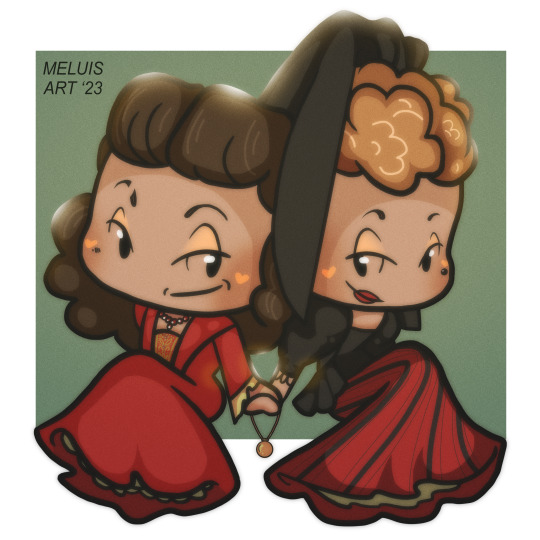
Just realised I never posted this cutesy drawing of Lucy and Moll to my tumblr. I did post it to twitter but I couldn't find it in my archive. So. @hannahdefoe put a gifset of them on my dash yesterday (I think) and so, I was reminded of them again. Help me before I fall into the deep end again XD
#lucy diver#moll flanders#nicola walker#alex kingston#the fortunes and misfortunes of moll flanders#meluisart
11 notes
·
View notes
Text
A "Perfect" Vacation Ch 12
The Next Morning, Back at the Hotel...
The group had all met up at the morning breakfast buffet, worried as they ate. They never saw Eis nor Sana return from their "adventure" out in the forest surrounding the hotel. "I hope those two are alright..." Iben said, giving Phil another pancake on his plate. "Um...Maybe they got lost?" Leo suggested, pouring a glass of orange juice.
"It's not a big island Leo, what could they have done? Swim out to sea to look at the fishes? That's Fiona's thing." Miguel pointed out, getting a annoyed glare from the diver in his direction. "Snarky comments aside, Miguel has a point, the island isn't exactly that big, they have to be SOMEWHERE." Lora said, playing peacekeeper between the two of them. "Maybe we can go find them. If the island really isn't that big, maybe Ka Lā can send out a search party, or giving us a map of the island." Trisha Jane suggested.
However, just as Kaylo was about to head out to find the owner, Both Sana AND Eis walked into the dining hall, both of which looked tired beyond compare. "Sana! Eis! You're OK!!" Lora Jade cheered, looking relieved to see the two of them safe and sound. "Hey guys...(YAAAAAAAAAAAAAWN) What did we miss?" Sana asked as she rubbed her tired eyes "Well...we were wondering where you were last night. You didn't come back to the hotel last night while you were out in the forest." Mei pointed out. Eis gave a carefree wave
"Oh...That, We had wandered a little to far, and accidentally stumbled onto the sight where they were building the stage for that publicity stunt..." he explained, still rubbing at his eyes. "Yeah, We had bumped into one of the workers, and they guided us back to the hotel." Sana explained. This made the group raise some eyebrows "Um...Why did you need some help? The hotel isn't that far away, and the island isn't that large." Rebecca asked, a little bit confused on the answer.
Before Sana could open her mouth again, Ka Lā entered the room, just as bombastic as yesterday "Good Morning everyone!" She shouted, walking over to the group "How did we all sleep last night?" She asked. Lucy gave a smile "Oh like a dream Darling! The beds were so comfortable, I almost didn't want to get up." She said as Ka Lā gave a sigh of relief. "Oh thank goodness! I was hoping that I wouldn't have to switch them all." She said. Mei then asked "Um...Ka Lā? Did one of your workers bring back Sana and Eis last night?"
Ka Lā then turned to her "Why of course dear! The two had been having a little TOO much fun last night, and they had gotten into the alcohol shed that I hide in the woods, and you know what happens when you drink just a little TOO much." She said. That got the kids even more confused. They haven't know Eis and Sana for very long, but they didn't seem like the type of people to get wasted on alcohol. Ka Lā then turned to see the tired duo "And I can see that you two are on a massive hangover. Why don't you have a little something that's not alcoholic." She says.
Ka Lā then snapped her fingers as a waiter with two glasses of water appeared. She took the glasses, and handed them to Sana and Eis. "C'mon now, drink up." She said. The two of them took a swig...only to immediately spat it out "UGH!!! This is saltwater!!" Sana yelled, seemingly more awake now. "Yes...I'm afraid that we haven't quite gotten the filter working yet, so all water that is given around the hotel, is directly from the sea. Luckily it's drinkable." Ka Lā said.
The two of them were too busy wiping the salt from their tongues, but to the group, ESPECIALLY the kids...something didn't quite add up with the story that they have heard. And something about Ka Lā not being that phased about her own alcohol shed being broken into didn't sit right with them...
Mei and Phil Bia belong to @sundove88
Rebecca belongs to @thehypercutstudios/@thehyperrequiem
Trisha Jane belongs to @lovelyteng
Lora Jade belongs to @alex-frostwalker
15 notes
·
View notes
Text
Kacy Twitter Fic - Failed Evidence Dive
*Lucy forcibly hauls Kate back off the ladder and into the boat*
Lucy: GET YOUR ASS BACK UP HERE!
Kate: Whoa! Lucy, I'm coming. Let go. I'm alright, okay? Luc-- HEY!
*Lucy handcuffs Kate to the arm rest of the chair she's sitting in*
Lucy: Kai, you tell the sharks hands off!
Kai: Um, okay... How?
Lucy: Figure it out!
Jesse: Now how are we supposed to get to the evidence?
Kate: Lucy, unlock these cuffs!
Lucy: We have Navy resources, get some divers and ask Pike to get rid of that thing!
58 notes
·
View notes
Text
Author Spotlight: WaitingForMyHogwartsLetter / @waiting-for-my-hogwarts-letter
Sink or Swim, rated T: I don't normally go for AUs but the author pulls you in, stays true to the characters, while exploring them in a different setting and it is SO cute and warm and fun! Features lonely Mermaid! Lucy and Divers! George & Lockwood. Every time this updates I squeal happily <3
Just Before The Walls Come Down, rated T : amazing fic that explores the idea of love languages for our cot3 and focuses on the effect of touch. It's so soft and sweet, I think probably my favorite chapter is the one about George.
Someone Throw A Lifeline (I Don't Wanna Drown), rated G: I love the way the author writes storms and Lockwood's fear of them. This is a sharing one bed fic but it's so perfect, so kind, it's one of my faves by this author (and there are many good ones to chose from!)
From the author:
Tell us about what inspired one of your fics?
Renegades was inspired by one of my other favourite book series: The Darkest Minds trilogy by Alexandra Bracken! I wanted to combine the world that first got me writing with the world that got me back into writing (Lockwood did that!) and it was so fun putting it all together! Fun fact: it started as a Locklyle fic but I changed the tags to Cot3 fairly early on because George decided to drive the relationship subplots and he was very much falling in love <3
Fave headcanon about L&Co?
Not character related but uhh secret passages in Portland Row. Lockwood has no idea, and George is the one that stumbles across them first. it’s endlessly funny to me.
If we like your fics, we should also read… (your recommendations):
Karim Family Christmas by TheMalapert. fake dating?? sneaking around at christmas?? insight into George’s family life and a bunch of Karim OCs?? hands down one of my favourites
Blinding Lights by @kennysbirthday pre-cot3 with lucy and george taking care of lockwood when he has a migraine, and it’s absolutely everything to me!! it’s so in character and so adorable :))
a matter of fact by cherriepixie27 I couldn’t stop smiling the whole time I read it it was just so brilliant
What’s next for you?
finishing Sink or Swim!! I have so much planned and so many threads to weave in for this plot!! it has layers guys, prepare yourselves
big bang fic that I’m not allowed to talk about yet ;)
cot3 fencing au in the works!! Locklyle are rivals initially and George is refereeing them (they’re not fencing each other they’re just riling each other up and he’s forced to mediate); as per my style it’ll be one hell of a slowburn <3
#lockwood and co#lucy carlyle#anthony lockwood#george karim#lockwood ot3#lucy/lockwood/george#cot3#lockwood fanfic#author: waitingformyhogwartsletter#lockwood fic rec#lockwood and co fanfiction
17 notes
·
View notes
Text
so, later in the story Lucy can access part of the Celestial Spirits' powers via star dresses
Duke Everlue is supposedly also a Celestial wizard
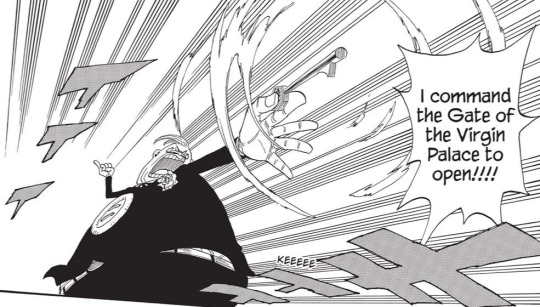
but he also has some "diver magic" which is awfully close to Virgo's ability
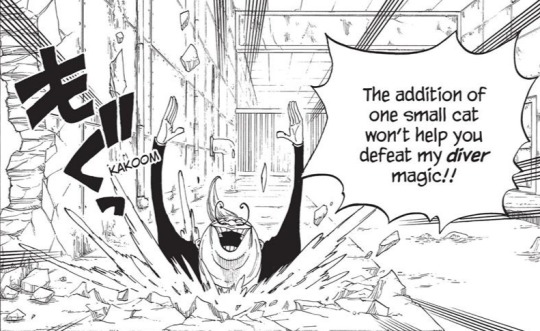
anyway, my point here is that this could be Duke Everlue's Virgo "star dress"
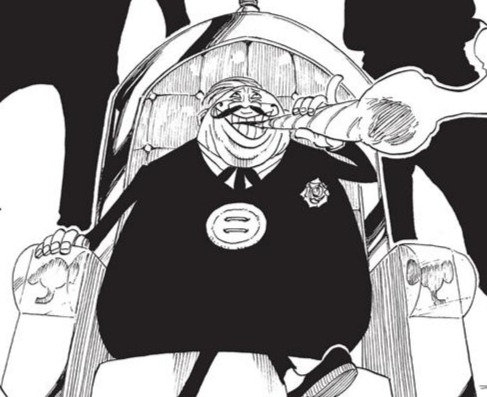
lol
24 notes
·
View notes